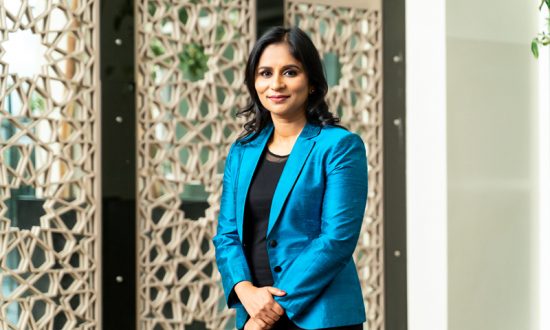Dr. Vidhya Vinod an entrepreneur, educationist and visionary enriches Study World with her expertise in creating, operating and delivering exceptional experiences in professional education. Dr. Vidhya is on the board of few schools and institutions in UAE, India and Qatar. She has distinguished herself as a student, sportsperson and socially committed citizen in her early years and is also a much lauded teacher. Through “Hope for tomorrow” initiative raised money and supported a few under privileged children with education and medical facilities. One of the youngest women CEO in the region, Dr. Vidhya aspires to use her innovation and management skills to establish reputed and commercially viable educational institutions in different parts of the world. Dr. Vidhya is a mother, homemaker and yoga enthusiast, who is highly committed and leads a balanced life style.
When I first started in Dubai in 2005, the higher education industry was still at its infancy. There were a few established higher education institutions, but by and large students, especially expats who had completed their schooling were either choosing to go abroad to study in the West or back to their home countries in the Indian sub-continent or the Middle East. Soon after the Dubai Knowledge Village set up there was a new wave of business friendly, free zone establishments, and the flow of international branch campuses started.
Especially over the last two decades, the UAE has provided a great platform for international higher education institutions’ aspirations for transnational education. For companies like ours, it was not just an opportunity to collaborate with reputable higher education institutions in Dubai, but also to use this learning to expand to other foreign markets.
Throughout the last decade, Study World has made various inroads in higher education in other countries too, including setting up operations in Malta, Sri Lanka, India and partner associations with various high schools and other education partners in the wider Middle East region. Such increases in both the number and quality of institutions in the region has also ensured that there is an increasing number of local students staying back in the home country and at the same time has promoted student mobility across countries in the Middle East. A key spinoff of this growth in higher education is obviously the increase in economic benefits to the society and to the countries in general.
While Covid-19 brought about some instability in the sector, I strongly believe that the higher education industry is bound to grow further in the future, despite the unsettling challenges of Covid-19 in the last one year. There is enough evidence to show that though the pandemic has brought about various economic and social disruptions in the minds of students, it has also made them mentally and emotionally strong. It has given educators, parents, students and other stakeholders a real-life scenario of optimizing results in the face of a crisis.
The world was caught off-guard to a great extent by this crisis, it has challenged our thinking to reflect and be ready for the unknown. As we have witnessed in several countries, technology has played a major role in helping ensure that overall education does not suffer. I think this will help boost the acceptance and adoption of technological models in education at all levels and in all forms throughout most countries in the Middle East region. This will also necessitate that teachers themselves are well-informed in using such solutions to achieve their class learning objectives. In fact, Covid has helped bring about a positive disruption that has forced schools and universities to think anew and reach out to a larger group of stakeholders in an inclusive and interlinked manner. With the long-term vision and strategic thinking of the UAE leaders, I reckon that most higher education institutions in the country and the sector in general will see growth going forward.
The possibility of an uncertain future will also help push demand for higher education as more and more individuals will seek to enhance their skills and knowledge to be better prepared for an evolving job market. It would not be unsurprising to see that programmes in Science and Technology see a major uptake in years to come.
One key trend that I think the sector will witness is the tremendous growth in the participation of women in the higher education sector in the Middle East. This, I think, will be in the form of growth in various key stakeholders – teachers, students, and importantly women entrepreneurs.




